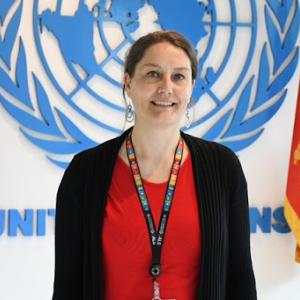1999 marks an important year in Timor’s history.
14 August 2019, Gleno, Ermera
Anjet Lanting
UN Human Rights Adviser in Timor-Leste
Dearest families of UNAMET staff who passed away, dearest invitees,
1999 marks an important year in Timor’s history.
In 1999, the Timorese people took an important step that led to the restoration of the country’s independence.
1999 also caused very deep wounds, and saw a continuation of the suffering the Timorese people faced during colonization and occupation.
We have come together today at the monument for the national heroes of timor, to honour all who lost their lives in the struggle for independence.
Today we pay special honours to our beloved staff of the UN mission, and in particular the UNAMET staff who lost their lives in 1999.
It was our UNAMET staff who ensured that the Timorese could exercise their freedom to express themselves, and to vote either to assert self-determination or integration with Indonesia. UNAMET derived its authority from the UN Security Council, to organize the Popular Consultation, as foreseen in the 5 May 1999 agreement signed by Indonesia, Portugal and the UN.
Many UNAMET staff risked their lives, being intimidated or attacked while serving the UN mission.
This has been documented in detail by the Timor-Leste Commission on Reception, Truth and Reconciliation – the CAVR. It has also been described in a report commissioned by the Office of the High Commissioner for Human Rights titled “East Timor 1999, Crimes Against Humanity”.
These two key documents describe how UNAMET staff, along many others, were the targets of violence by militia, and Indonesian police and army, pre- and post-Popular Consultation.
Fifteen UNAMET staff brought the ultimate sacrifice and lost their lives.
It was here in Ermera that the first victims died post-voting, and both of them were UNAMET staff. And it was here in Ermera that 5 of the 15 UNAMET staff lost their lives.
On 30 August, in Baboi Leten, Atsabe Sr. Joao Lopes and Sr. Orlando Gomes were killed when bringing ballot boxes out the polling station on 30 August. They and their colleague Sr. Alvaro Lopes were stabbed, and both died from their injuries. Sr. Alvaro Lopes survived.
Three other UNAMET staff from Ermera were killed shortly after the Popular Consultation. Today we also commemorate their sacrifice. Sr. Manuel de Oliveira lost his life at the hands of militia acting on the orders of TNI soldiers on 31 August, also in Atsabe. Dona Ana Lemos, who was queue controller for UNAMET and whose remains are buried at this very monument, was killed on 13 September. Her son will speak later about her in this ceremony. Sr. Jose Ernesto de Jesus Maia was killed allegedly by militia on 30 September, also in Atsabe.
But it was actually in Liquica that the first UNAMET staff member, Mariano da Costa was killed, on 8 August. His body has not been found till today.
We also commemorate the deaths of Sr. Domingos Pereira and Sr. Ruben Barros Soares, two UNAMET staff who were dragged out of their homes and killed by militia and military personnel on 2 September in Maliana. Also in Maliana, former staff Sr. Carlos da Silva Maia lost his life at the hands of army personnel and militia, and together with 11 others, his body was brought to the beach in Batugade.
In Dili, staff members Leonel da Silva Oliveira and Hilario Boavida da Silva along with many others had sought refuge at the Dili Diocese compound. They were taken away and killed by and under the watch of militia, army and police, between 5 and 6 September. A day earlier, UNAMET staff Manuel Antonio Campos died in the UNAMET compound in Dili that was crowded with staff and people seeking shelter, from a heart attack
On 21 September, battalion 745 while withdrawing from Lautem, killed UNAMET staff Abreu da Costa in Buruma, Baucau, together with his brother.
When violence started to subside in other parts of the country, Oecusse saw the worst of it even into October. On 20 October, Paulos Quelo and Francisco Taek were killed at Maquelab market in front of a large group of villagers with whom they had fled to the mountains. They had been taken back to the village by militia who said they would be able to travel safely to West Timor, but instead, they were killed.
Along with great sadness about the loss of our colleagues, we express pride for of the service they gave to the United Nations. We honour our 15 colleagues who brought the ultimate sacrifice while serving our common organization that was set up to maintain international peace and security, and to promote universal respect for, and observance of, human rights and fundamental freedoms for all.
It is with compassion that we honour the families of our 15 colleagues who have had to bear the gravest pain and have had to come to terms with the loss of their loved ones.
May their souls rest in peace.
Thank you.


